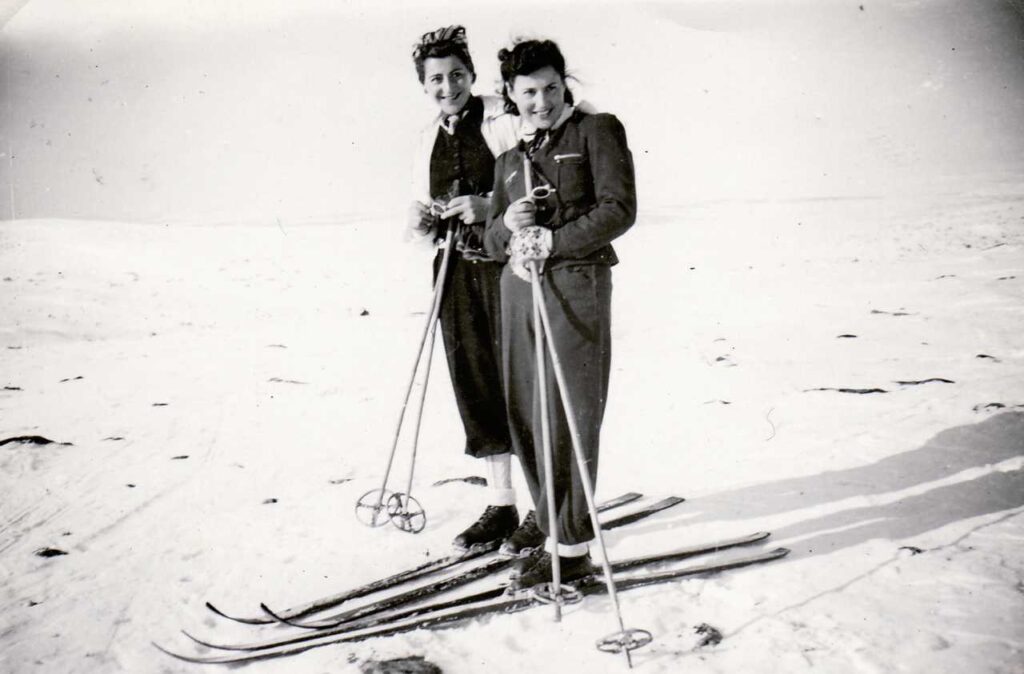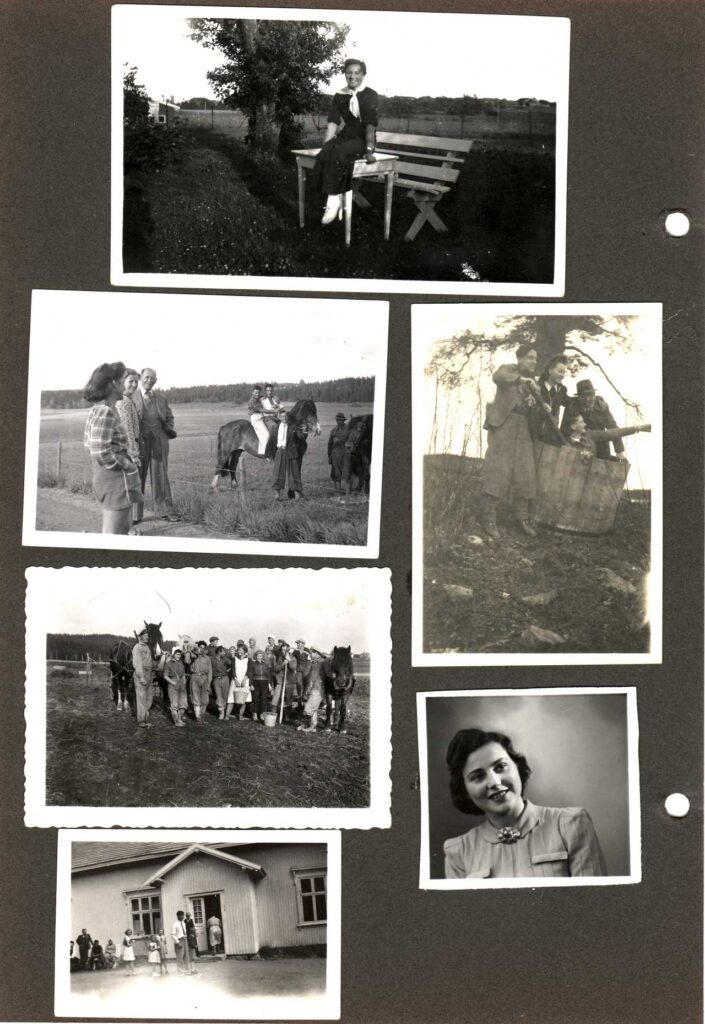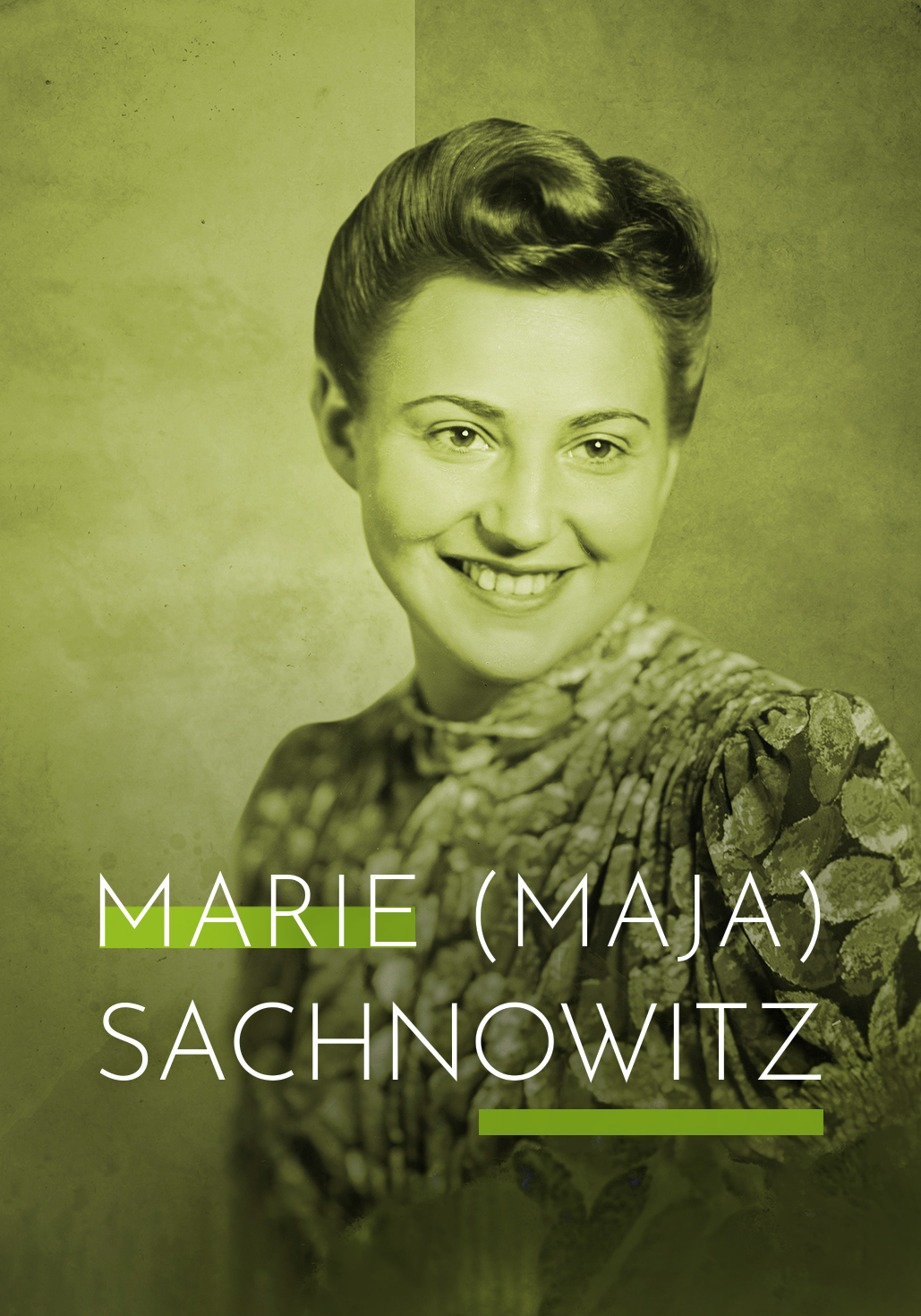1919, Larvik — I XII 1942, KL Auschwitz-Birkenau
Biography
Marie (Maja) Sachnowitz was a highly regarded singer from Larvik. For many years she entertained audiences with jazz-inspired music.
Born in Larvik, Norway, in 1919, she was the middle child of eight siblings, all born between 1910-1925. Her parents, Sara and Israel Leib, emigrated from Czarist Russia in the early 20th century. Her mother was born in the shtetl Klikol, today’s Klykolai, in Lithuania on the border with Latvia. Her father was born in Krasnapolye in modern-day Belarus. They gradually settled in the Vestfold region of Norway, where her father set up a clothing shop in Larvik in 1911.
Marie came from a highly musical family. By the interwar years, they were well integrated taking an active part in the local music and community life. Like the rest of her family, Marie was passionate about music. In addition, she was an excellent pianist with a beautiful voice for which she became popular. She was praised for her performances in Larvik by the newspapers, and in 1938 she was named Princess of Larvik (Larvikprinsesse). In the summer of 1940, she joined Harmony Kings, a jazz orchestra in which her brothers Martin and Herman played wind instruments. Martin was the leader of the band.
In 1942, the Nazi occupiers began to arrest Norway’s Jews with the help of local police authorities. 773 were arrested; only 35 Norwegian Jews return home at the end of the war. Marie Sachnowitz was arrested on 26 November 1942 and deported on the ship SS Donau later that same day. Her father, brothers, and fiancé Idar Paltiel from Trondheim, were also on board. Her sisters Frida and Rita were deported later. During the crossing, Marie was allowed to go on deck where she sang the romantic hit Månestrale (‘The Moonbeam’). In the cargo hold just below, where the Jewish men were confined, Idar and Marie’s family heard the familiar voice, as the Donau sailed out of the Oslo Fjord. Later, her brother Herman, the only survivor of the Sachnowitz family, described this moment in his memoirs. The few men who survived the 1942 deportation, finding themselves in an extremely reduced state, would also never forget her beautiful voice.
When the SS Donau docked at Stettin (today Szczecin, Poland), the prisoners were herded into cattle cars to continue their journey by train. Like all the other Jewish women and children transported on the SS Donau, Marie Sachnowitz was sent directly to the gas chamber on her arrival at Auschwitz-Birkenau on 1 December 1942.

Photo of Marie skiing with her sister Rita. From the collection of Oslo Jewish

From a family album. From the collection of Oslo Jewish
Marie (Maja) Sachnowitz was a highly regarded singer from Larvik. For many years she entertained audiences with jazz-inspired music.
Born in Larvik, Norway, in 1919, she was the middle child of eight siblings, all born between 1910-1925. Her parents, Sara and Israel Leib, emigrated from Czarist Russia in the early 20th century. Her mother was born in the shtetl Klikol, today’s Klykolai, in Lithuania on the border with Latvia. Her father was born in Krasnapolye in modern-day Belarus. They gradually settled in the Vestfold region of Norway, where her father set up a clothing shop in Larvik in 1911.
Marie came from a highly musical family. By the interwar years, they were well integrated taking an active part in the local music and community life. Like the rest of her family, Marie was passionate about music. In addition, she was an excellent pianist with a beautiful voice for which she became popular. She was praised for her performances in Larvik by the newspapers, and in 1938 she was named Princess of Larvik (Larvikprinsesse). In the summer of 1940, she joined Harmony Kings, a jazz orchestra in which her brothers Martin and Herman played wind instruments. Martin was the leader of the band.
In 1942, the Nazi occupiers began to arrest Norway’s Jews with the help of local police authorities. 773 were arrested; only 35 Norwegian Jews return home at the end of the war. Marie Sachnowitz was arrested on 26 November 1942 and deported on the ship SS Donau later that same day. Her father, brothers, and fiancé Idar Paltiel from Trondheim, were also on board. Her sisters Frida and Rita were deported later. During the crossing, Marie was allowed to go on deck where she sang the romantic hit Månestrale (‘The Moonbeam’). In the cargo hold just below, where the Jewish men were confined, Idar and Marie’s family heard the familiar voice, as the Donau sailed out of the Oslo Fjord. Later, her brother Herman, the only survivor of the Sachnowitz family, described this moment in his memoirs. The few men who survived the 1942 deportation, finding themselves in an extremely reduced state, would also never forget her beautiful voice.
When the SS Donau docked at Stettin (today Szczecin, Poland), the prisoners were herded into cattle cars to continue their journey by train. Like all the other Jewish women and children transported on the SS Donau, Marie Sachnowitz was sent directly to the gas chamber on her arrival at Auschwitz-Birkenau on 1 December 1942.

